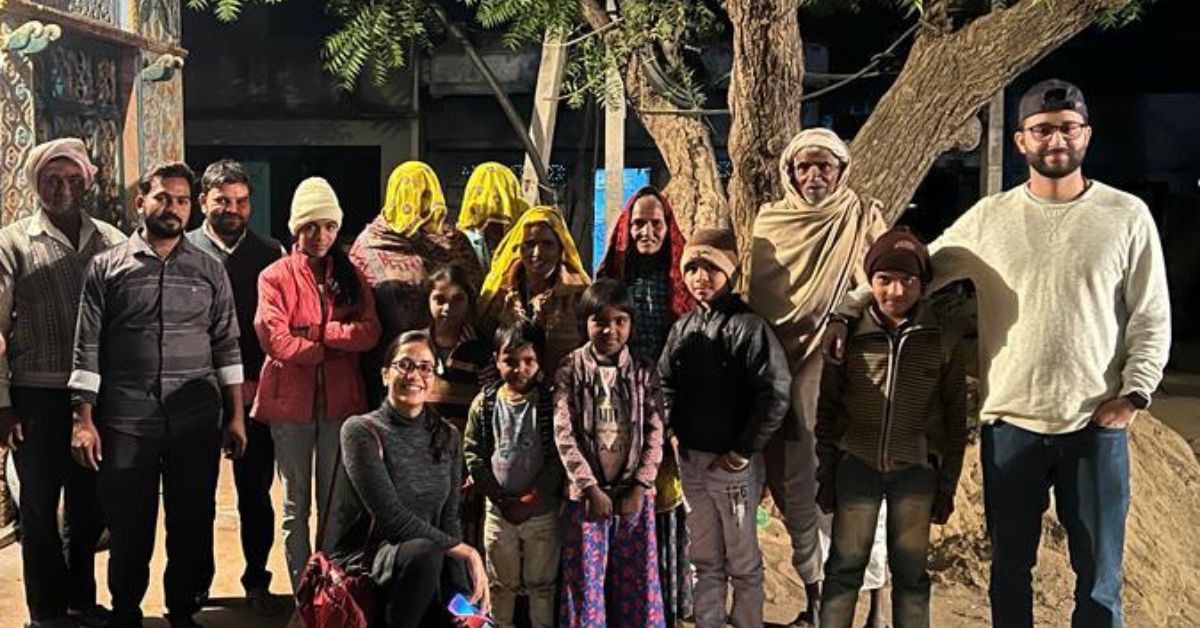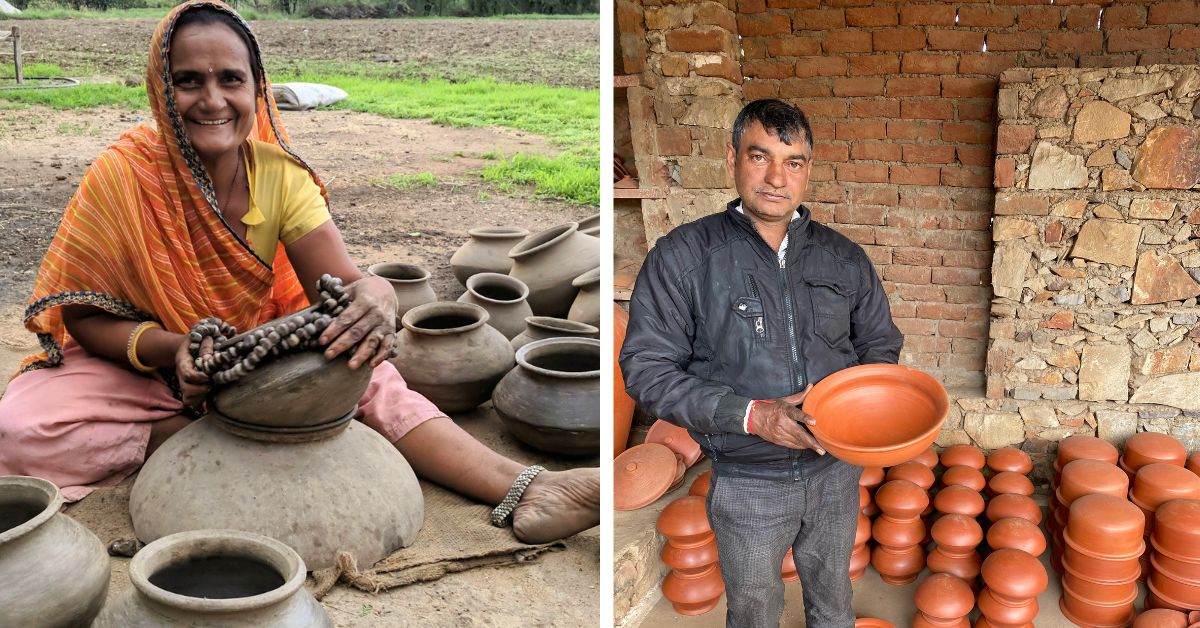During my childhood summers, a prominent feature was the earthen pots that naturally cooled the water. I loved the distinctive smell of these pots. However, as I grew older, that natural aroma was replaced by the artificial scent of plastic bottles stored in the fridge.
As more people adopted modern technology, traditional potters and artisans gradually began to lose their livelihoods. “Their art has been dying, becoming a seasonal practice, which has forced future generations of artisans to seek other employment,” says Dattatreya Vyas, the founder of Swadeshi Blessings.
Located in the heart of Rajasthan, this family-run business specialises in creating clay utensils and kitchenware. The mission is to revitalise the livelihoods of potters and craftsmen by eliminating middlemen and connecting their products directly with consumers. By partnering with over a hundred artisans, the company has provided year-round employment opportunities.
Recently, the brand impressed the investors on Shark Tank Season 2, securing a deal of Rs 50 lakh from Namita Thapar and Vineeta Singh.
A chance encounter
Becoming an entrepreneur was never part of Dattatreya’s plan. “I was happily working in the corporate world. No one in my family had ever ventured out to become entrepreneurs and I had no plans either,” he says.
The journey began during the challenging days of the COVID-19 lockdown. “We were all working from home,” he recalls, “and amidst the uncertainty, we found inspiration right in our backyard. In the evenings, we used to stroll around our locality and nearby villages. One evening, we noticed several potters selling their crafts to tourists, their livelihoods dependent on tourism. Due to the lockdown, they were struggling to make ends meet.”

Traditionally reliant on tourism, these artisans faced a stark reality as the lockdown brought all travel to a halt. “My family and I connected with them, realising we could help provide a more stable income and elevate their art form. So, my mother, sister-in-law, brother, and I decided to help them,” he adds.
This laid the foundation for ‘Swadeshi Blessings’, which became a registered business in 2020. “However, I was quite unsure about how to proceed and whether it was the right decision. So, I did not quit my job and managed both things simultaneously. It was only in 2023 that I decided to quit my job and commit fully to the business,” he informs.
He talks about the hurdles he faced while setting up the business, saying, “With limited resources and knowledge, we turned to YouTube to learn everything from listing products to marketing. Packaging presented a significant challenge, as our products needed to be securely packed for international shipping. Additionally, we developed an instruction manual to help customers use and maintain our products properly,” he says.
Collaboration with more and more artisans every day!
Presently, Swadeshi Blessings collaborates with over 120 artisans spread across Rajasthan and beyond. “Our artisans are our backbone,” he emphasises, “They are skilled craftsmen, many of whom have been recognised with President’s Awards or UNESCO accolades.”
The partnership is not just transactional, it’s a symbiotic relationship aimed at preserving traditional crafts while ensuring economic stability, he shares.
The artisans, predominantly women, play a pivotal role in every aspect of production. From sourcing and mixing clay to shaping and finishing each piece, their expertise ensures that every Swadeshi Blessings product meets stringent quality standards. “We ensure that our products are lead-free and safe for use,” he explains, underscoring their commitment to both craftsmanship and consumer health.
The company makes products such as mugs, bowls, wine glasses, cookers, cooking pots, saucepans, tawa (frying pan), kadhai (wok), mud handi (cooking basin), tea light holders, idols, and more — all using clay.
The artisans are given orders on the basis of demand, and they make the products from the comfort of their homes. “We then collect the products, perform a quality check, and then pack them up and ship them to our customers,” he says. “Connecting with us has significantly improved the potters’ income, providing them with consistent orders year-round. This has also encouraged the younger generation to stay in the family business, preserving the art form.”
Motilal Ji (54) who has been working with Swadeshi Blessings for around four years, says, “We no longer have to wander for work. Previously, our jobs lasted only a few months each year due to inconsistent orders. Since working with Swadeshi Blessings, we have year-round work with a smooth payment cycle, including timely advances and full payment upon order completion.”
He adds, “Our income has increased significantly. Fulfilling one batch of orders in 1.5 to two months has tripled our monthly income compared to before.”

Initially focusing on clay cooking utensils, Swadeshi Blessings has expanded its repertoire to include wooden and marble handicrafts. They sell over 65 types of cooking utensils currently, informs Dattatreya. Each product reflects a blend of traditional artistry and modern sensibilities, resonating well with health-conscious consumers globally.
“After the pandemic hit the nation, we noticed a shift among people towards healthier lifestyles,” he observes. “They are not just buying products; they are also embracing a cultural narrative.”
With consumers all over the world, Dattatreya highlights that it is the export market that has the most demand. “We are currently exporting to 20 countries and selling in cities like Delhi, Hyderabad and Bengaluru in India,” he says.
Looking ahead, Swadeshi Blessings aims to strengthen its presence in international markets while fostering deeper roots in India. “We’re expanding offline, starting with partnerships like that with Nature’s Basket,” he reveals. “Our goal is to make Swadeshi Blessings a household name, synonymous with quality and tradition.”
Talking about his experience at Shark Tank India, he says, “It was phenomenal, providing us with vast reach and significant marketing value. We secured Rs 50 lakh total funding from Sharks Namita Thapar and Vineeta Singh for 5% and 4% equity respectively. The journey involved multiple rounds, including video pitches and a live presentation before the actual shoot, which was both nerve-wracking and exciting,” he says.
The company currently clocks an annual turnover of Rs 5 crore. However, Dattatreya says, “It’s not just about profits. It’s about preserving our heritage, empowering artisans, and creating a legacy for future generations.”
You can buy their clay utensils here.
(Edited by Pranita Bhat; All Images Credit: Swadeshi Blessings)
No comments:
Post a Comment